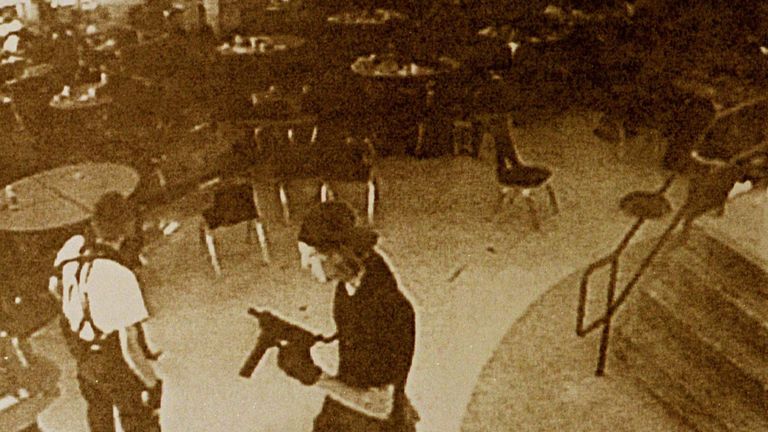Crimea college massacre could be the start of Russia's own gun crisis
The Columbine shootings set off decades of mass shootings in the US. Could Russia be about to suffer the same after Crimea?
Thursday 18 October 2018 19:58, UK
A horrifying photo landed in my inbox from my producer today.
It was a photograph of the corpse of Kerch Polytechnic killer Vladislav Roslyakov sent to us by a student.
He had shot himself in the college library, half his brain was spilt out across the floor.
The slogan on his T-shirt, hard to read on other CCTV shots I'd seen, now clear.
"Nenaveest", it said in Russian - "hate".
I'm not the first to make reference to Columbine in this latest appalling school shooting.
As soon as the first photo came out of Roslyakov walking down a stairwell, rifle in hand, wearing a white t-shirt with black lettering it drew comparisons with Eric Harris, one of the two Columbine High School killers who had worn similar clothes.
Roslyakov placed a bomb in the college cafeteria just as Harris and Dylan Klebold had done at Columbine almost 20 years before.
Their attacks and his started shortly after 11am. He killed himself after an orgy of bloodletting in the college library, just as they had done.
But Roslyakov managed to kill many more, 20 at the last count.
Until now Russia has been immune from mass school shootings, though earlier in the year there were a number of smaller incidents with no fatalities - three in a week - which were enough to scare authorities that the infection had spread.
The reason I draw attention to the Columbine similarities - and all shootings draw their inspiration to a certain extent from that grim original - is that it makes me wonder whether part of Roslyakov's hideous plan was to set the ball rolling in Russia, just as the Columbine killers did in the US.
Authorities have every right to be extremely concerned.
Russia's gun laws are far stricter than they are in the US, which is already a deterrence.
Russia's president has attributed the Kerch college massacre in part to globalisation.
"We can see whole communities created in social media and on the internet," Vladimir Putin said.
"It has all started with tragic events in the United States, in their schools. And young people with an unstable state of mind create fake heroes for themselves."
It would seem Roslyakov did just that. And then wiped his digital traces in order to further confuse the investigation.
You can be sure that one consequence of his actions, with wider implications than the terrible grief I see around me in Kerch, is a more concerted effort on the part of Russian authorities to control the internet.
Watch this space.






